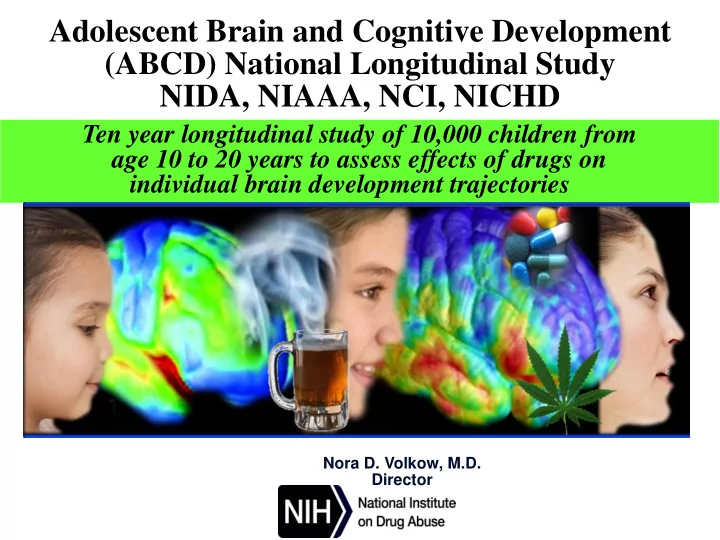

Adolescent Brain and Cognitive Development (ABCD) National Longitudinal Study NIDA, NIAAA, NCI, NICHD Ten year longitudinal study of 10,000 children from age 10 to 20 years to assess effects of drugs on individual brain development trajectories Nora D. Volkow, M.D. Director
Adolescent Brain and Cognitive NIDA NIAAA NCI Development (ABCD) NICHD National Longitudinal Study Expert panel workshop to develop recommendations on best large-scale designs and measures to assess developmental effects of substance exposure (beginning prior to exposure) during childhood through adolescence (in human subjects) – May 27-28, 2014 A Request For Information to get input on proposed study design/measures July-August 2014 Revised design based on input from RFI to be presented for further discussion at satellite symposium at SfN. FOA to be released early in 2015
Members of Expert Panel
Central Research Questions: • What is the impact of diverse patterns of use of marijuana, alcohol, nicotine and other substances on the structure and function of the developing brain, as revealed by brain imaging? • What are the consequences of substance use on physical health, psychosocial development, information processing, learning, memory, academic achievement, motivation, emotional regulation, and other behaviors? • How does drug use affect the expression of psychopathology, including substance use disorders, and how does the emergence of psychopathology influence drug use? • What factors (prenatal exposure, genetic, epigenetic, neurobiological, psychosocial, family history) influence drug use and its consequences during development? • In what way does use of each substance contribute to the use of others (gateway interactions)?
Prospective cohort study of ~10,000 youth beginning ~ ages 9-10 Substance use, Cognition, Emotion, Mental Health, Physical health, Executive Function, General Intelligence, Environment, Biospecimens: Genetics, Epigenetics
Recommend
More recommend